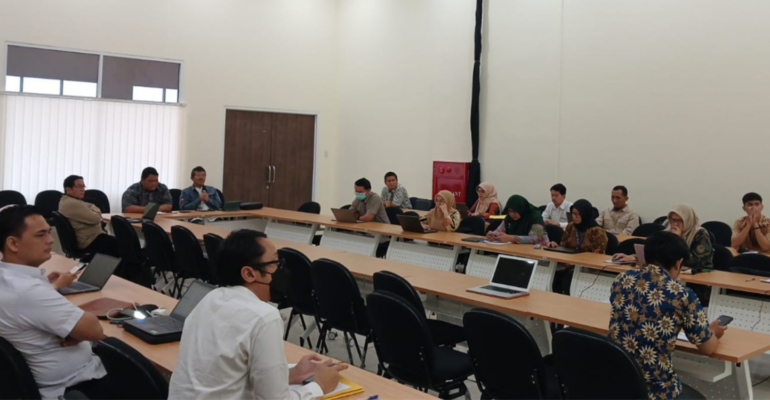IPB University Holds Kick Off Meeting of HSE Risk Management Implementation

In an effort to strengthen the culture of risk awareness and implementation of risk management and occupational safety health and environment (K3L), the Risk Management Office (KMR) of IPB University held the K3L Management System Kick Off Meeting (SMK3L). This event presented lecturers and education personnel (Tendik) who have been competent and certified in general HSE and laboratory HSE from various faculties/schools within IPB University.
Chairman of KMR IPB University, Dr Budi Purwanto in his speech stated that SMK3L must be integrated with the institution’s overall risk management. This is to ensure that risks related to Occupational Health and Safety or Kesehatan dan Keselamatan Kerja (K3) and the environment are considered in the context of general organizational risks.
“The process of identifying Occupational Health and Safety and environmental risks must be carried out systematically and comprehensively, involving the identification of all potential hazards and related risks that may affect stakeholders, the work environment, and the surrounding natural environment,” he explained during the event which took place at the Institute of Science and Technology Area (LKST) IPB University, Taman Kencana Campus, Bogor.
He further explained that the monitoring and review process must be carried out continuously. The action is to ensure that risk control is effective and risks remain within acceptable limits.
Furthermore, in a discussion session guided by the Chairperson of the K3 Division of KMR IPB University, Dr drh Aulia Andi Mustika, participants gave oral reports on the existing conditions of K3 implementation in their respective schools/faculties.
Vice Dean of the Faculty of Mathematics and Natural Sciences (FMIPA), Dr Zainal Abidin explained, the high risk of OHS in the FMIPA laboratory requires awareness of all parties. For this reason, he said, currently his party has begun to require educational laboratory administrators (PLP) and practicum assistants in the laboratory to make Job Safety Induction.
Meanwhile, Prof Efi Yuliati Yovi from the Faculty of Forestry and Environment (Fahutan) suggested the importance of safety induction in every activity in the laboratory, both wet lab and field lab. “It can be made in the form of a short video as we have done so far,” she said.
Furthermore, Prof Endang Warsiki from the Faculty of Agricultural Technology (Fateta) said that Fateta has routinely held Good Laboratory Practice (GLP) training twice a year. Hazardous and Toxic Materials or Bahan Beracun dan Berbahaya (B3) waste has also been managed properly, handed over to a third party. “We have also formed a Risk and K3 Control Group based on the dean’s assignment letter,” he added.
Representative from the Faculty of Human Ecology (Fema), Dr Zuraidah Nasution, gave appreciation for the progress of the standard operating procedure (SOP) for handling Hazardous and Toxic Materials or Bahan Beracun dan Berbahaya (B3) waste that had been prepared by KMR IPB University. On that occasion, she also provided some input related to the SOP.
The Vocational School currently has a risk and Occupational Health and Safety or Kesehatan dan Keselamatan Kerja (K3) commission. Now the main focus of K3 Vocational School is the risk of falling trees. Therefore, in the near future, there will be a data collection of trees in the Vocational School environment.
“The discussion results and suggestions are expected to be input for us in the SMK3L implementation process. Among others, the importance of immediately compiling the legality of the risk and K3 commission / task force structure in each unit, enforcing employee and student discipline, communication and awareness, and of course the integration / synergy of all parties,” said Dr Budi Purwanto.
He also hoped that risk management related to HSE at IPB University could be carried out effectively in accordance with the principles of risk management suggested by the SNI ISO 31000 standard. (*/Rz) (IAAS/HLF).



